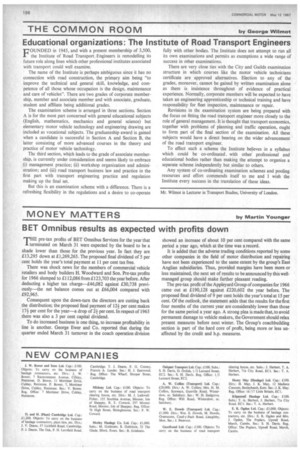Educational organizations: The Institute of Road Transport Engineers
Page 198

If you've noticed an error in this article please click here to report it so we can fix it.
UOUNDED in 1945, and with a present membership of 3,500, the Institute of Road Transport Engineers is remodelling its future role along lines which other professional institutes associated with transport could well examine.
The name of the Institute is perhaps ambiguous since it has no connection with road construction, the primary aim being "to improve the technical and general skill, knowledge, and competence of all those whose occupation is the design, maintenance and care of vehicles". There are two grades of corporate membership, member and associate member and with associate, graduate, student and affiliate being additional grades.
The examination scheme is arranged in three sections. Section A is for the most part concerned with general educational subjects (English, mathematics, mechanics and general science) but elementary motor vehicle technology and engineering drawing are included as vocational subjects. The graduateship award is gained when a candidate is successful in Section A and Section B, the latter consisting of more advanced courses in the theory and practice of motor vehicle technology.
Tilt third section, which leads to the grade of associate membership, is currently under consideration and seems likely to embrace (i) management practice; (ii) workshop organization and administration; and (iii) road transport business law and practice in the first part with transport engineering practice and regulation making up the final set.
But this is an examination scheme with a difference. There is a refreshing flexibility in the regulations and a desire to co-operate fully with other bodies. The Institute does not attempt to run all its own examinations and permits as exemptions a wide range of success in other examinations.
There are very close ties with the City and Guilds examination structure in which courses like the motor vehicle technicians certificate are approved alternatives. Election to any of the grades, moreover, cannot be gained by written examination alone as there is insistence throughout of evidence of practical experience. Normally, corporate members will be expected to have taken an engineering apprenticeship or technical training and have responsibility for fleet inspection, maintenance or repair.
Revisions in thf examination system are being prepared with the focus on fitting the road transport engineer more closely to the role of general management. It is thought that transport economics, together with problems of planning and traffic operation, ought to form part of the final section of the examination. All these subjects would have a direct bearing on the wider advancement of the road transport engineer.
To effect such a scheme the Institute believes in a syllabus which could be co-ordinated. with other professional and educational bodies rather than making the attempt to organize a separate scheme independently but similar to others.
Any system of co-ordinating examination schemes and pooling resources and effort commends itself to me and I wish the Institute every success in the translation of these ideas.
















































































































































































































































